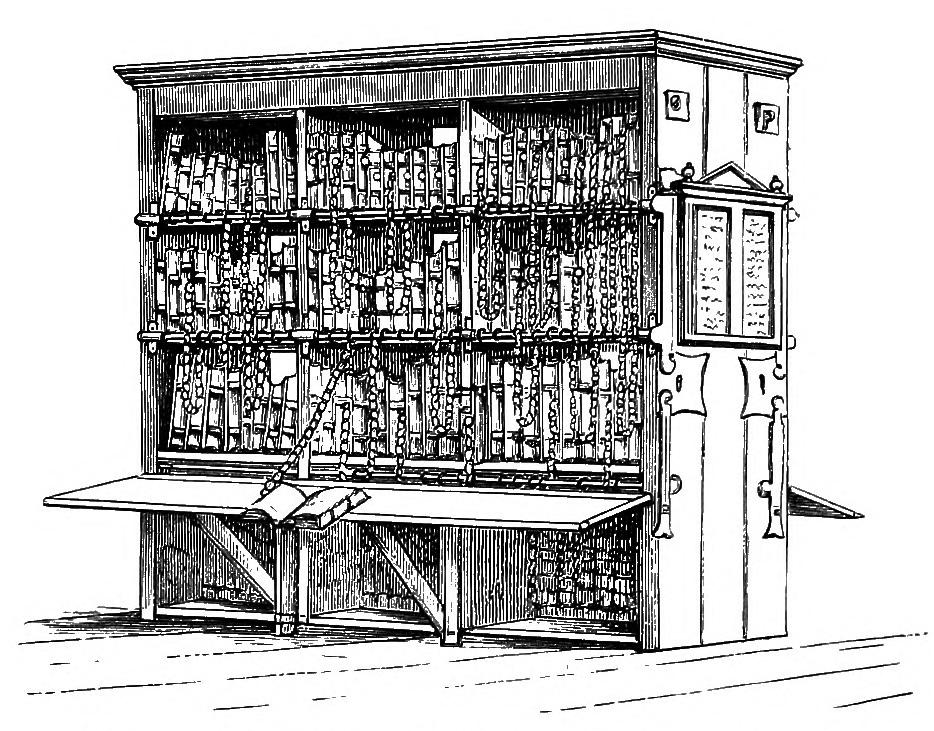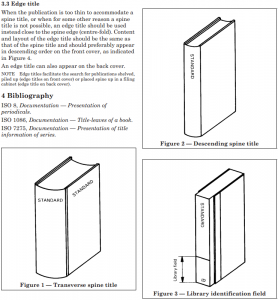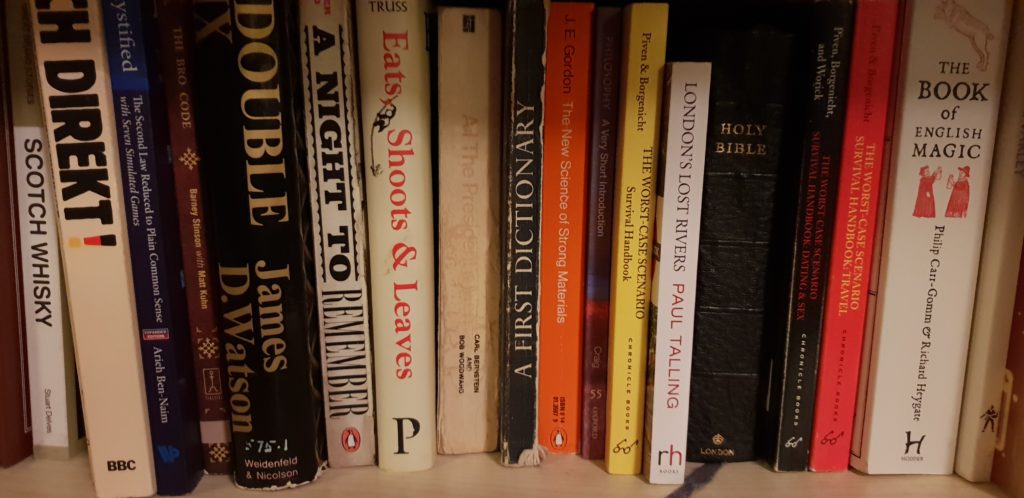Have you noticed how the titles printed on the spines of your books are all, for the most part, oriented the same way? That’s not a coincidence.

ISO 6357 defines the standard positioning of titles on the spines of printed books (it’s also codified as British Standard BS6738). If you assume that your book is stood “upright”, the question is one of which way you tilt your head to read the title printed on the spine. If you tilt your head to the right, that’s a descending title (as you read left-to-right, your gaze moves down, towards the surface on which the book stands). If you tilt your head to the left, that’s an ascending title. If you don’t need to tilt your head in either direction, that’s a transverse title.

The standard goes on to dictate that descending titles are to be favoured: this places the title in a readable orientation when the book lays flat on a surface with the cover face-up. Grab the nearest book to you right now and you’ll probably find that it has a descending title.

But if the book is lying on a surface, I can usually read the cover of the book. Only if a book is in a stack am I unable to do so, and stacks are usually relatively short and so it’s easy enough to lift one or more books from the top to see what lies beneath. What really matters when considering the orientation of a spine title is, in my mind, how it appears when it’s shelved.
It feels to me like this standard’s got things backwards. If a shelf of anglophone books is organised into any kind of order (e.g. alphabetically) then it’ll usually be from left to right. If I’m reading the titles from left to right, and the spines are printed descending, then – from the perspective of my eyes – I’m reading from bottom to top: i.e. backwards!
It’s possible that this is one of those things that I overthink.
Firstly, the notion of a pile of anything less than 10 books confuses me.
Secondly, the standard is correct. I don’t think I understand the line “If I’m reading the titles from left to right, and the spines are printed descending, then – from the perspective of my eyes – I’m reading from bottom to top: i.e. backwards!”
If you’re stood looking at a shelf, you read the titles L>R in ascending order of classification system, and those titles that are printed with descending titles are printed the right way round – you tilt your head, and walk along the shelf with your eyes tracking from left to right, going up the classification sequence, and each descending title is presented to you in the correct alignment. Ascending titles ruin everything (that blasted dictionary in the picture sticks out like a sore thumb because it’s misaligned), but basically in scanning a shelf, you just tilt your head to turn the shelf into a horizontal stack, and everything else lines up nicely, barring ascending titles which are completely back to front (but then they always are), and transverses which are mildly annoying just because you usually have to look up higher, ie, further from the labels, to see what they are. But the whole shelf becomes a slightly-bigger-than-average stack which you read as you go up the sequence, and nothing apart from ascending titles is backwards…
(I’ve literally just stood in the shelves trying get this to *not* happen, and the only way I could make it work was by uncomfortably standing back-to-front with my right shoulder closest to the shelves, so that as I walked along the shelf I was stepping backwards). .
Possibly this is just one of those accustomisation things – I guess if I were used to scrolls I’d find the descending orientation confusion since I’d not be used to spines – but I’m genuinely struggling to see how you can possibly scan a shelf of books and somehow be reading the descending titles from bottom to top!
German titles are typically ascending. I find it a bit strange aesthetically because titles have to be right justified. However, I don’t find it too much harder to scan a row of titles unless I accidentally mix some English descending titles onto the same shelf.
Well, i grew up in Switzerland and here if you are in a front of a bookshelf you automatically turn your head on the left side, so that ou can read the title from the bottom to the top.
And i think it’s because we are writing from left to right and it depends on which side you turn your head. For the most german speaking area its normal to write from the bottom to the top and for the english speaking the other way around.